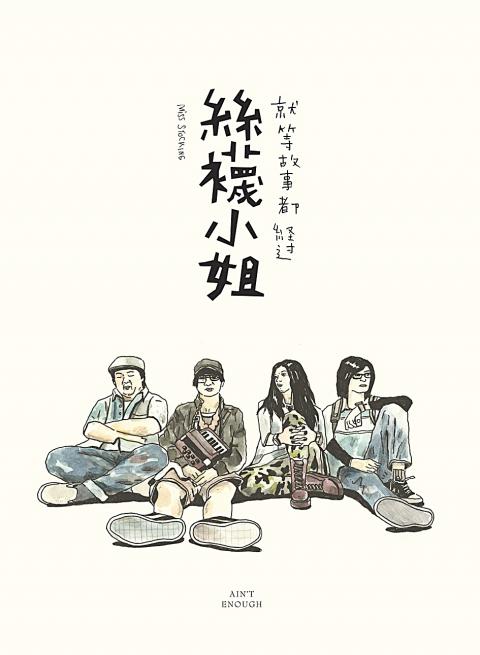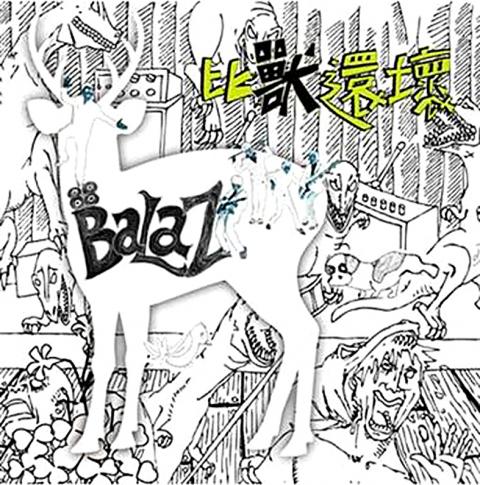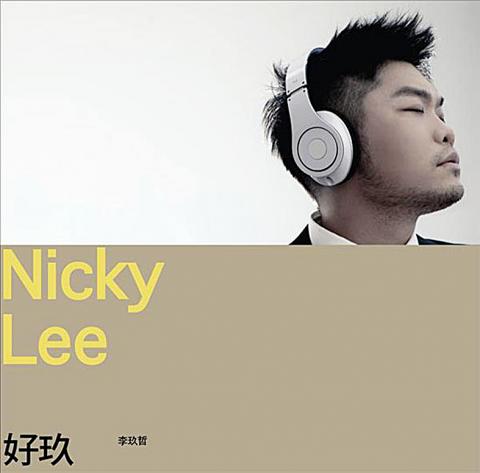Miss Stocking (絲襪小姐)
Ain’t Enough (就等故事都經過)
AsiaMuse/HeyWatchOut Ltd

Miss Stocking (絲襪小姐) is an indie-pop band with a clean, immaculate sound that centers on the whispery sweet vocals of female singer-songwriter Chan Cheng-yun (詹正筠).
The band’s first full-length album, Ain’t Enough (就等故事都經過), leans toward the mainstream with tight pop arrangements, but also holds escapist appeal with song structures that embrace indie rock melodrama. Fans of Taiwanese post-rock might recognize the chiming guitar work by Huang Chien-hsun (黃建勳), aka Hsiao Bai (小白), also a member of Sugar Plum Ferry (甜梅號).
But it’s Chan’s enchanting voice that draws listeners into Miss Stocking’s world, which is also portrayed in a comic included with the CD. The 40 pages of manga-style illustrations, drawn by Chan, follow the band members as they search for Kaduoli (卡多里), a mythical amusement park in a “magic forest” on the outskirts of the city.

As it dwells on the characters’ (the band members’) personality quirks, the comic, while nicely illustrated, comes across as self-absorbed. But there are a few poignant moments in the story, such as when Chan’s character, Hsiao Gui (小龜), reveals her reasons for searching for Kaduoli: her grandfather told her about the amusement park when she was a child, but she always thought the story to be make-believe. Years later, while sick in the hospital, he promised to take the adult Hsiao Gui there if he recovered. That didn’t happen, and thus she yearned to find Kaduoli.
Scenes like this, along with the comic’s surreal conclusion, make the story seem less insular, and also lend weight to the music. With dreamy acoustic tracks like In the End, the slow-burning rocker Solitude and the joyful, carnival-like The King’s Playground (國王操場), it’s obvious that the songs are intended to have a symbiotic relationship with the story.
The album displays solid songwriting and pristine production values, and fans of Taiwanese indie pop will likely warm up to it right away. Casual listeners, though, may have to make an extra effort to appreciate the band’s inward gaze.

— DAVID CHEN
88 Balaz (88顆芭樂籽)
Man Is Worse Than an Animal When He Is an Animal (比獸還壞)

Himalaya Records
88 Balaz (88顆芭樂籽), a favorite in Taiwan’s indie rock scene, returns with a solid follow-up to its 2008 release The 44 Stone Lions (肆十肆隻石獅子).
The barrage of electric guitars and screeching hoots and howls from lead vocalist Ah-Chang (阿強) live up to the album’s mouthful of an English title, Man Is Worse Than an Animal When He Is an Animal (比獸還壞).
One reason that 88 Balaz enjoys a loyal following is the group’s onstage verve, and this album is a decent snapshot of that energy.
The first track, 21st Century Rock ’n’ Roll Style, offers a modern tribute to AC/DC by quoting the main lyric from the Australian band’s classic tune It’s a Long Way to the Top (If You Wanna Rock ’n’ Roll), and is followed by another rollicking anthem, Adrenaline Song (腎上腺素之歌).
The declarations of “rock ’n’ roll” start to feel a little repetitive by the time Man Is Worse Than an Animal gets to Give You a Flying Kick Before I Die (我要在死之前給你一個飛踢), but the album’s saving grace is its catchy blues-rock grooves and Ah-Chang’s screamo vocals.
The band brings in a horn section for the ska-infused Let’s Dance (一起來跳舞) — a reflection of the growing popularity of reggae and its related genres among Taiwanese music fans. One of the CD’s better tracks, 29 Years Old (29歲) gets the brass treatment too, with the sound referencing The Clash circa London Calling.
While the album is full of punk sneering and “let’s party” attitude, Ah-Chang shows nuance in his songwriting, particularly in the slower, low-key closing tracks. The surreal lyrics, breezy chords and spacey grooves make Bad Temper Fish (脾氣不好的魚) equally as fun and compelling as the fast songs, and Taipei, Taipei (台北台北) is an honest and thoughtful ode to the band’s home base.
— DAVID CHEN
Nicky Lee (李玖哲)
Long Time (好玖)
Asia Muse
South Korea-born American
R ’n’ B crooner Nicky Lee (李玖哲) is that rare performer who is capable of maintaining a music career in a language he isn’t well versed in. A Best Mandarin Male Singer Golden Melody Award-winner for his second album, Baby It’s Me (Baby是我), Lee proves that a soulful voice can cross the language barrier.
But in Lee’s newest outing, Long Time (好玖), mediocre material prevents him from doing his emotive voice justice.
The album’s most glaring blooper is opening track Right Here Waiting. Meant as a homage to Richard Marx, this cover sees Lee performing a note-by-note imitation of Marx’s original with little improvisation.
Faring much better is Lee’s cover of Air Supply’s hit Making Love Out of Nothing at All. On this track, which formed part of the sound track to gangster flick Monga (艋舺), Lee deploys his idiosyncratic brand of R ’n’ B phrasing to update what could easily have turned out to be a pedestrian cover of a hackneyed
love song.
Best known as an R ’n’ B singer, Lee flourishes on the album’s two up-tempo tracks. In Summer (夏天), written by Mando-pop king Jay Chou (周杰倫), Lee successfully gets his mouth round some rapid-fire rapping.
Elsewhere, Lee’s soulful voice flounders on turgid tracks, such as The Last Day (最後的那一天), and the banal No More Love (不愛了).
Although Lee whittled the album’s six self-penned songs down from a purported 38, his original material doesn’t stand out. With merely nine tracks and clocking in at just under 40 minutes long, the album is short but not sweet.
— ANDREW C.C. HUANG
Elva Hsiao (蕭亞軒)
Miss Elva (瀟灑小姐)
Golden Typhoon Music
Not long ago, Mando-pop diva Elva Hsiao (蕭亞軒) rejuvenated her career with the pop confection Diamond Candy (鑽石糖). Now she returns with another electronica-driven album, Miss Elva (瀟灑小姐).
With her proud declarations of female empowerment and synthesized dance music sound, Hsiao could have called this album “Feminist on the Dance Floor.”
Although previously acclaimed for her entrancing delivery of R ’n’ B ballads, Hsaio has grasped dance music with both hands. With Miss Elva, her most dance-heavy album to date, she successfully establishes herself as a rival to dancing queen Jolin Tsai (蔡依林).
To infectious beats, Hsiao sings “Oh, I like you/Oh, don’t repress it” on the title track Miss Elva, and then encourages her lover to join her in a flight of romance in Let Love Fly (讓愛飛起來).
The album’s opening optimism turns sour on Big Liar (大說謊家), with Hsiao condemning a deceptive lover. And then come the ballads. She moans about misspent love in The Wrong One (錯的人), and rails at someone who takes romance frivolously in Joke (玩笑).
Though the lukewarm romantic tracks do not pack the same poignancy Hsiao achieved in her earlier work, such as I Love So Much (我愛你那麼多) or Interlude (插曲), what is lost here is more than made up for by the kinetic energy of the album’s feel-good electronica.
Perhaps on her next album, Hsiao will juggle her newfound passion for dance music and her powerful vocals with a finer balance.
— ANDREW C.C. HUANG

June 2 to June 8 Taiwan’s woodcutters believe that if they see even one speck of red in their cooked rice, no matter how small, an accident is going to happen. Peng Chin-tian (彭錦田) swears that this has proven to be true at every stop during his decades-long career in the logging industry. Along with mining, timber harvesting was once considered the most dangerous profession in Taiwan. Not only were mishaps common during all stages of processing, it was difficult to transport the injured to get medical treatment. Many died during the arduous journey. Peng recounts some of his accidents in

“Why does Taiwan identity decline?”a group of researchers lead by University of Nevada political scientist Austin Wang (王宏恩) asked in a recent paper. After all, it is not difficult to explain the rise in Taiwanese identity after the early 1990s. But no model predicted its decline during the 2016-2018 period, they say. After testing various alternative explanations, Wang et al argue that the fall-off in Taiwanese identity during that period is related to voter hedging based on the performance of the Democratic Progressive Party (DPP). Since the DPP is perceived as the guardian of Taiwan identity, when it performs well,

The Taiwan People’s Party (TPP) on May 18 held a rally in Taichung to mark the anniversary of President William Lai’s (賴清德) inauguration on May 20. The title of the rally could be loosely translated to “May 18 recall fraudulent goods” (518退貨ㄌㄨㄚˋ!). Unlike in English, where the terms are the same, “recall” (退貨) in this context refers to product recalls due to damaged, defective or fraudulent merchandise, not the political recalls (罷免) currently dominating the headlines. I attended the rally to determine if the impression was correct that the TPP under party Chairman Huang Kuo-Chang (黃國昌) had little of a

A short walk beneath the dense Amazon canopy, the forest abruptly opens up. Fallen logs are rotting, the trees grow sparser and the temperature rises in places sunlight hits the ground. This is what 24 years of severe drought looks like in the world’s largest rainforest. But this patch of degraded forest, about the size of a soccer field, is a scientific experiment. Launched in 2000 by Brazilian and British scientists, Esecaflor — short for “Forest Drought Study Project” in Portuguese — set out to simulate a future in which the changing climate could deplete the Amazon of rainfall. It is